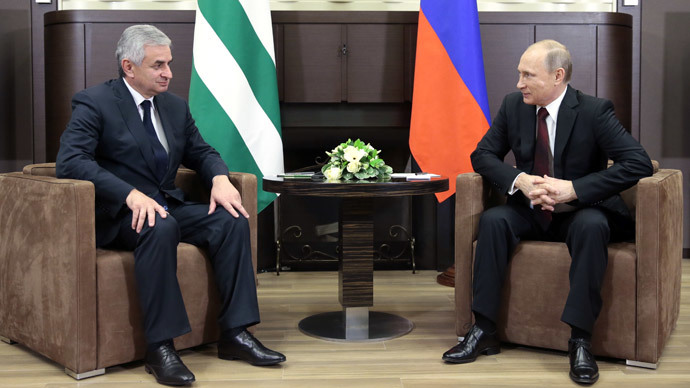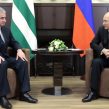
In the Face of Recent Russian-Abkhaz Disagreements, is Georgian-Abkhaz Dialogue Possible?
Publication: Eurasia Daily Monitor Volume: 12 Issue: 128
By:

In the Russian-occupied Georgian region of Abkhazia, the last couple weeks of June 2015 were dominated by news of an unusual spat between the typically submissive Abkhazian separatists, on the one hand, and their Russian patrons, on the other. The disagreement between the two sides came to light on June 17, when it became clear that Moscow would not transfer promised financial aid, worth five billion Russian rubles ($90 million), to Abkhazia’s “state budget” until next year. The news caused somewhat of an uproar inside the Abkhazian separatist “parliament,” as the promised Russian aid makes up about 35 percent of Abkhazia’s annual budget of 12 billion rubles ($216 million). Some Abkhazian “deputies” quickly expressed anger at the developments, stating that Sokhumi should turn down Russian financial help in the future, sign treaties with Moscow only as between two equal sides, and introduce lease payments on Russian military bases located in the breakaway territory (Rezonansi, June 17).
Days later, the matter became further exacerbated. Vladislav Surkov, the aide to Russian Prime Minister Dmitry Medvedev, announced an ultimatum that if Sukhumi did not ratify the project establishing a joint information and coordination center of the interior ministries of Russia and Abkhazia, Moscow would not transfer the financial aid it has promised at all (Rezonansi, June 29). The establishment of such a joint center is a part of the controversial Russian-Abkhazian “Agreement on Alliance and Strategic Partnership,” which the two sides signed in November 2014. The treaty envisages a gradual merger of Russian-occupied Abkhazia’s security, law enforcement, defense, border, customs, economic and healthcare agencies with that of Russia’s within the next three years (see EDM, October 29, 2014; November 24, 2014).
Some Abkhazians have expressed qualms about the treaty, seeing it as a major step toward the end of Abkhazia’s fictional “independence.” In particular, the treaty’s initial name, the “Agreement on Alliance and Integration,” covertly suggested to Abkhazians that the document’s ultimate goal was, indeed, the region’s eventual merger with the Russian Federation. In the face of this initial opposition, Moscow removed the word “alliance” from the treaty’s original title and changed it to “strategic partnership” (Civil Georgia, November 3, 2014; November 22, 2014). With this superficial change, the Kremlin pushed the Abkhazian separatists to swallow a hard pill. However, as recent developments show, the separatists do not seem entirely satisfied with how things turned out.
Official Abkhazian media outlets, as well as Russian media sources, have been distinctly mute about the existing disagreements in Sukhumi. Even most Georgian news sources missed it entirely. Nevertheless, the disagreements between the Abkhazian separatists and their Russian patrons are undeniable. Some politicians in Sukhumi went so far as to accuse Russia of meddling in Abkhazia’s affairs and presenting new demands before every new transfer of funds (Rezonansi, June 29).
These recent developments in Abkhazia raise a wide range of questions. First, how broad is the opposition to Moscow among the separatist political elites? So far, it seems to be limited to the confines of the separatist “parliament.” No member of the separatist “government,” let alone separatist “president” Raul Khadzhimba, expressed opposition to the implementation of the treaty or voiced displeasure about the delay of Russian financial aid.
This first question leads to a second: Can the recent Abkhazian-Russian disagreements create an opportunity for renewed Abkhazian-Georgian dialogue? So far, the current Georgian government has not shown any signs that it noticed the Abkhazian-Russian spat or was able, or even willing, to somehow make use of it. However, this is of a secondary importance. The bigger question is: Even if the Georgian government took notice of the ongoing events in Sokhumi, how much power and influence do those Abkhazian deputies actually have to steer political processes within the breakaway region? At this stage, it does not seem that they wield much authority at all. Rather, real power and influence within the Abkhazian separatist elites appears to lie with the current “president” and “government,” which do not show any signs of anti-Russian opposition.
Fourth, in light of the recent tensions between Sukhumi and Moscow, might Abkhazian separatist elites start turning back toward Georgia? After all, those elites have been distinctly anti-Georgian and unwaveringly pro-Russian for decades. Are Abkhazian-Russian disagreements profound enough to spark some soul searching within the separatist elites and convince them of the rationale of turning to Georgia? That still remains to be seen.
One way or another, the largest obstacle to a renewed Abkhazian-Georgian dialogue remains the Russia factor. Indeed, Moscow, which fully controls Abkhazia militarily, economically and politically, can destroy—politically or even physically—any opposition group that challenges the Kremlin’s dominance there or that might steer the breakaway region back to Georgia. Certainly, the position of the Abkhazians matters somewhat to giving impetus to a potential Abkhazian-Georgian dialogue. Nevertheless, the Russian factor is paramount.
So, the biggest question remains: Against the background of Russian-Abkhazian disagreements, how possible is a renewed and meaningful Abkhazian-Georgian dialogue? Hypothetically, such a dialogue is feasible. After all, Abkhazian separatists may finally realize where their quasi-state is headed. To date, the war with Georgians brought them widespread destruction; the consequent mass expulsion of ethnic Georgians resulted in the economic collapse of the entire region; and their fictional “independence” has, in fact, turned into a full-blown Russian military occupation. Today, the region is gradually being annexed into Russia proper.
The rude awakening of some separatist groups to the brutal reality of creeping Russian annexation may not be enough in itself to launch renewed talks with Tbilisi. Those concerned groups do not yet appear broad enough or influential enough to steer Sukhumi’s course. Moreover, it is difficult to see how they can manage to act under Russian occupation and the intense political-military-economic pressure from Moscow. Time will tell in which direction the trend lines will develop.




